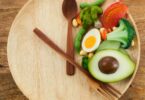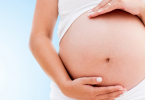Are you pregnant? Congratulations! A wonderful and exciting time lies ahead of you! Of course, you want to make sure that the little miracle in you lacks nothing and that it finds superb conditions for its development.
So you probably have a whole bunch of questions: How should I eat so that my baby does not lack anything? Are there any points where I should be particularly careful now?
In this article I would like to summarize the most important recommendations of the German Nutrition Society for you. You will see that it is not complicated at all.
I’ll start with the things you will want to watch out for, and then I’ll give you a few rules of thumb for good nutrition during your early pregnancy. The best thing about it: This diet is so versatile and wholesome that not only your baby but also you and your whole family will benefit from it.
No-goes: drugs, smoking, alcohol
I certainly don’t need to tell you that you shouldn’t smoke.
Alcohol is also really harmful for your baby. It gets directly into the child’s bloodstream via your placenta – so your baby drinks every sip with you. Alcohol is therefore taboo from now on. Incidentally, this even applies to alcoholic dishes such as tiramisu.
You should also stay away from caffeinated energy drinks. Quinine (found in bitter lemon or tonic water, for example) is also on the list of ingredients that could be problematic for your baby’s health.
There are also a few points to consider when choosing food, which I will describe in detail below.
(By the way: It really has nothing to do with nutrition, but another no-go is the cat litter box due to the risk of a toxoplasmosis infection – from now on, your partner must clean it)
In moderation only
Just like tea or cola, coffee should be consumed in small quantities only during your pregnancy. The good news: Up to 3 cups a day are considered harmless 😊.
For balanced blood sugar level, I also recommend that you only rarely drink high-sugar drinks.
Quality beats quantity
The most important motto for nutrition during your pregnancy is quality beats quantity. Definitely, you won‘t need to eat for two now when it comes to the amount of food. You only need a little more energy from the fourth month of pregnancy. The additional requirement is relatively low at only 255 cal per day. What you do need however, is a premium diet with plenty of precious healthy ingredients.
The basis of your diet: Crunchy vegetables and fruits
Vegetables, salads and fruits form the basis of your diet. For optimal levels of valuable vitamins, minerals and secondary plant substances, it would be ideal if you could choose seasonal organic products from your region as often as possible.
Hygiene
During pregnancy, pay special attention to hygiene in food preparation. Wash fruits and vegetables thoroughly and peel them if necessary.
Carbohydrates provide valuable energy
When you are pregnant, you should prefer whole grain products. They ensure that, in addition to plenty of minerals, you also get valuable fiber. This helps with various ailments that can otherwise occur during pregnancy.
Proteins
They provide the necessary building blocks for the development and growth of your baby as well as blood formation. Vegetable protein from legumes, whole grain products or potatoes is very valuable. For optimal care, nutrition experts advise against a purely plant-based, i.e. vegan, lifestyle during pregnancy and recommend regularly supplementing the plant proteins with animal protein sources.
Protection from food poisening
When choosing food during pregnancy, you should pay particular attention to ensure that it does not pose a risk of food infection.
Nutritionists recommend avoiding raw animal foods altogether during pregnancy. Eggs should always be fully cooked, as should meat. Did you know that many sausages (e.g. raw ham, salami, etc.), but also dairy products (e.g. raw milk cheese) are really raw as well?
No offal
Because of increased pollution, it is advisable to refrain from eating offal during pregnancy.
Fish twice a week
Fish twice a week would be great because it contains valuable omega-3 fatty acids, which are very important for the development of your baby’s eyes and brain. Preferably choose fish species that are not at the end of the food chain, as these are unfortunately often heavily contaminated with mercury and other heavy metals. Tuna, perch and pike are therefore not a suitable choice; you want to prefer wild-caught salmon.
Dairy
A wonderful source of protein, but also important minerals such as calcium, are low-fat milk and dairy products. However, as I said, make sure not to choose raw milk or raw milk cheese. A little tip on the side: it is best to cut off the rind of cheese.
Healthy fats
Supplement your food choices with healthy fats. Cold-pressed, virgin olive oils and rapeseed oils are excellent sources of healthy fatty acids, as is salmon or avocado.
Healthy cooking techniques
As mentioned before, quality should be the top priority for nutrition during pregnancy. This applies not only to the choice of food, but also to its preparation. Rely on types of preparation that preserve the valuable ingredients as much as possible. Have you ever tried a steamer basket? Here, vegetables stay fresh and crisp and retain their full nutrient content. Smoothies are also a great way to fully benefit from the valuable components of the ingredients.
Add extra vitamins
Please continue to use your fertility vitamins until the end of the first trimester of your pregnancy. They ensure a simple and safe supply of sufficient folic acid, iodine, iron and possibly other valuable vitamins and minerals. But please do not buy a new bulk pack now, because towards the end of the first trimester of pregnancy the requirements change and experts recommend switching to pregnancy vitamins.







